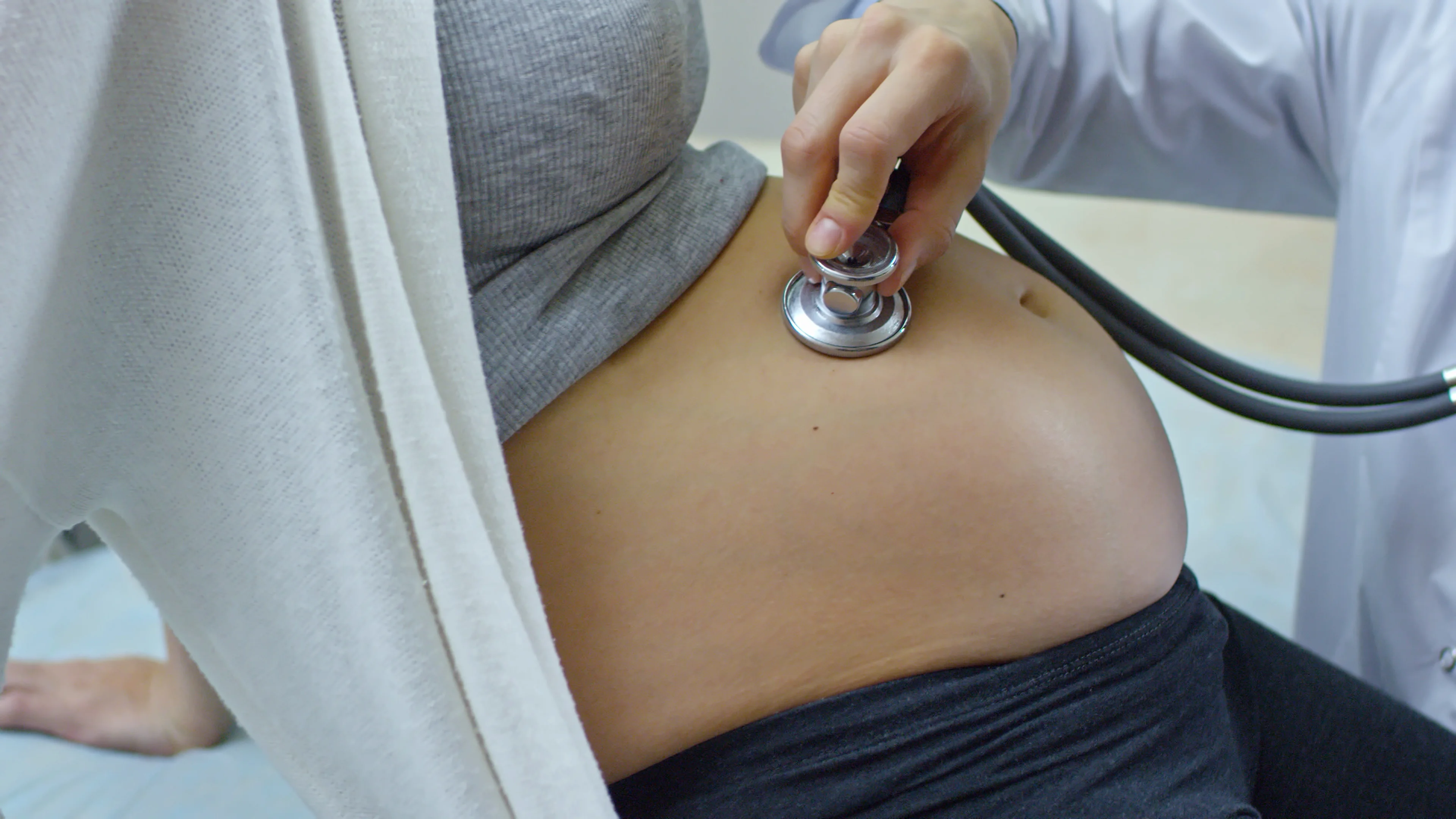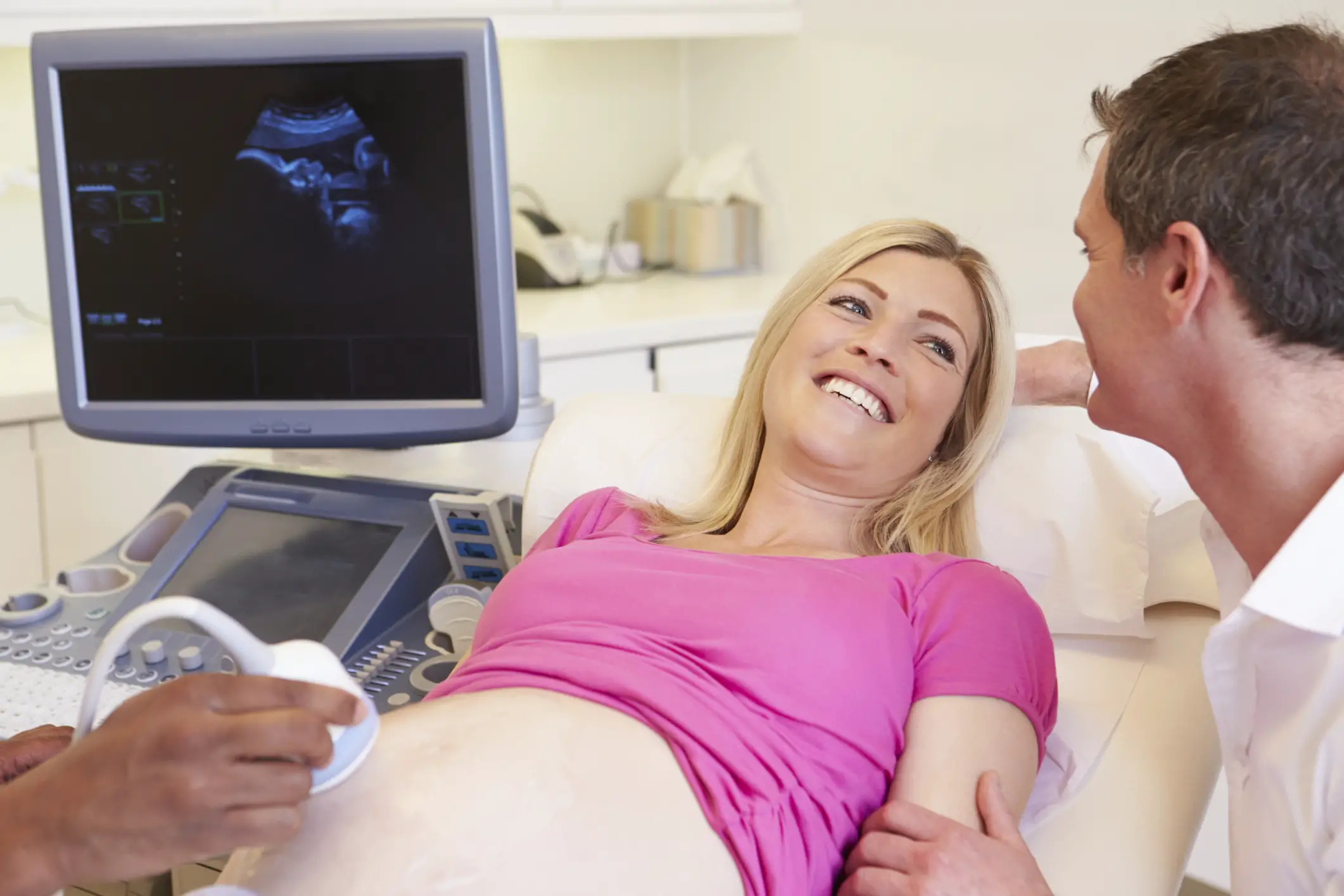Table of Contents
When can you hear baby’s heartbeat with a stethoscope? One of the most exhilarating facets of pregnancy is hearing your baby’s heartbeat for the first time. It’s almost like meeting your child for the first time when you hear that unmistakable thump, thump, thump. It’s one of the most reassuring sounds, and while it may sound the same to you from checkup to checkup, the heart and circulatory system are changing dramatically every week of your pregnancy!

The first time you listen to your unborn baby’s heartbeat is something you’ll never forget. So, when can you hear baby’s heartbeat with a stethoscope? By week 20 of pregnancy, you should be able to hear your baby’s heartbeat with a stethoscope. However, an ultrasound can detect this lovely sound as early as the sixth week, and a fetal Doppler can detect it as early as 12 weeks. If you are pregnant, you will undoubtedly want to hear your baby’s heartbeat. A healthy fetal heartbeat indicates that a baby is developing normally. Read on to find out more about when can you hear baby’s heartbeat with a stethoscope.
When can you hear baby’s heartbeat with a stethoscope?
Around week 20 of pregnancy, you can usually hear your baby’s heartbeat with a stethoscope – about eight to ten weeks after Doppler detects it.
If you have received an ultrasound, you may hear your baby’s heartbeat for the first time around week 10 of pregnancy, though this can vary.
Can’t seem to hear it? Don’t be concerned. It most likely means that your shy guy is hiding in the uterine corner or has his back to the outside, making it difficult for the Doppler to find his target. Your practitioner will check in with you at your next appointment to ensure everything is in order. You should be able to hear your baby’s heartbeat at that point.
When can you hear baby’s heartbeat with a stethoscope? Normal Fetal heart rate
Your baby’s heart will beat 110 times per minute by 6 weeks. The fetal heart rate will advance to 150 to 170 beats per minute in two weeks. That is approximately twice as fast as yours!
By week 9 or 10, your baby’s heart rate is around 170 beats per minute, a rate that will gradually slow down. It will decrease to around 140 beats per minute around week 20.
A normal fetal heart rate during labor can range from 110 to 160 beats per minute, with brief variations outside of this range occurring for various (often perfectly normal) reasons.
Where can you obtain a stethoscope?
When can you hear baby’s heartbeat with a stethoscope? Where can you obtain a stethoscope? Stethoscopes are widely obtainable, so you don’t have to be a medical professional to buy one. They can be bought from medical supply stores, drug stores, and online.
Keep in mind, however, that not all stethoscopes are created equal. When shopping for one, read product reviews and descriptions to ensure you get one that works for you.
A stethoscope with good acoustic and audibility quality and one that is lightweight and comfortable to wear around your neck is ideal. The size of the tube is also important. The larger the tube, the faster the sound can reach the earpiece.

Also Read: How To Combine Breastfeeding And Pumping- 7 Useful Tips!
How to hear your baby’s heartbeat using a stethoscope
When can you hear baby’s heartbeat with a stethoscope? How to hear your baby’s heartbeat using a stethoscope? Here are some pointers on how to use a stethoscope to hear your baby’s heartbeat:
- Find a quiet place. The quieter your environment, the easier it will be to hear your baby’s heartbeat. Sit alone in a room with no television or radio.
- Place yourself on a soft surface. You can listen to your baby’s heartbeat while lying in bed or on the couch.
- Find your baby’s back by feeling around your stomach. A fetal heartbeat can be heard best on the baby’s back. This area of your stomach should be firm but smooth.
- Place the chest piece on your stomach in this location. You can now start listening through the earpiece.
You might not hear it right away. If this is the case, slowly move the stethoscope up and down until you hear a sound. Fetal heartbeats can resemble the ticking of a watch beneath a pillow.
What should you do if you can’t hear your heartbeat?
When can you hear baby’s heartbeat with a stethoscope? What should you do if you can’t hear your heartbeat? If you can’t hear your baby’s heartbeat, don’t worry. Hearing a heartbeat at home with a stethoscope is one method, but it is not always effective.
Your baby’s position may make it difficult to hear, or you may be too far in your pregnancy to detect a heartbeat with a stethoscope. The position of the placenta can also make a difference: if you have an anterior placenta, the sound you’re looking for may be more difficult to find.
You may attempt again at a later time. Nevertheless, if you have any concerns, please contact your OB-GYN.
Your doctor has probably heard hundreds, if not thousands, of heartbeats. Although hearing your child’s ticker in the comfort of your own home is heartwarming (pun intended), you should not use what you hear – or don’t hear – to diagnose any problems. That is something you should leave to your doctor.

When can you hear baby’s heartbeat with a stethoscope? How long do you have to wait?
You’ve probably been anticipating the day you’ll be able to hear your baby’s strong and healthy heartbeat, which can be reassuring for new parents from the moment you find out you are pregnant. Unfortunately, it does not always occur as quickly as you would like.
A genuine fetal heartbeat can be detected as early as 5 1/2 to 6 weeks after conception. Typically, a vaginal ultrasound is required to detect that first sound.
If a doctor placed a stethoscope on a pregnant woman’s belly at 6 weeks, they would most likely not hear a heartbeat because the baby’s heart hasn’t fully formed yet.
However, the best time to hear those wonderful beats is around 6 1/2 to 7 weeks after conception.
This is why doctors often advise waiting until you’re about 8 weeks pregnant to get your first ultrasound (though this may still be too early!). They don’t want you to become anxious if they can’t detect your heartbeat earlier than that.
When can you hear baby’s heartbeat with a stethoscope? When does their heart begin to beat for the first time?
The heart is the first organ to form and function in the womb and is the source of life for your baby. The first time your baby’s heartbeats will most likely occur around 3 weeks after conception, though you won’t be able to hear it that early.
That teensy tiny beating noise is so faint at that point that no one can hear it. Around weeks 4 and 5, the heart will beat more steadily.
The development of your baby’s heart and circulatory system
The fetal heart development begins early in pregnancy, and your baby’s ticker persists in changing even after birth as he modifies from the womb to the outside world.
- Development in the first trimester
When can you hear baby’s heartbeat with a stethoscope? Within your embryo, a distinct blood vessel has formed by week 4, which will soon evolve into your baby’s heart and circulatory system. At week 5, the preliminary structures that comprise your baby’s heart begin to beat spontaneously.
In its early stages, it looks like a tube that twists and divides to form the heart and valves (which relax and tight to release blood from the heart to the body). During the first few weeks, precursor blood vessels begin to form in the embryo.
By the sixth week, your baby’s heart has four hollow chambers, each with an entrance and exit for blood flow. Exciting circulatory evolutions continue at 12 weeks when your baby’s bone marrow begins to produce blood cells.

- Development in the second trimester
When can you hear baby’s heartbeat with a stethoscope? The fetal brain has started to regulate the heartbeat by 17 weeks in preparation for life in the outside world. (Up until this point, the heart had been beating on its own.)
During the second trimester, capillaries form at an exponential rate. These teeny-tiny blood vessels transport oxygenated blood to your baby’s tissues and recycle deoxygenated blood back into the circulatory system.
Your doctor will review the structure of your baby’s heart and look for any congenital heart defects during your second-trimester ultrasound.
Your doctor may recommend a fetal echocardiogram between 18 and 24 weeks of pregnancy if he or she needs a better listening and view of your baby’s heart. If you have a family history of congenital heart defects, or if you have diabetes, phenylketonuria, or an autoimmune disease, you should get one.
- Development in the third trimester
When can you hear baby’s heartbeat with a stethoscope? During the third trimester, the baby’s circulatory system will develop slowly and steadily until it is ready to emerge from the womb at 40 weeks.
Know how the Fetal Heart Functions
While the fetal circulatory system develops rapidly during pregnancy, it operates quite differently in utero than after your baby is born.
Because babies do not breathe in utero, the lungs do not function before birth. Until then, his developing circulatory system depends on the umbilical cord for an uninterrupted supply of oxygen- and nutrient-rich blood. The umbilical arteries and veins transport what your baby requires from you to him and then return unoxygenated blood and waste products to you for removal.
Major physical differences between the fetal and adult heart serve to direct blood away from the baby’s lungs, which aren’t required in utero. The fetal heart contains:
- There are three shunts. These bypasses divert blood away from the lungs and liver.
- The arteriosus ductus. This fetal artery connects the pulmonary artery (which eventually transports blood from the heart to the lungs) to the aorta (which will bring blood from the heart to the body). In utero, it diverts blood away from the lungs.
- An oval foramen. This womb-only opening between the heart’s upper chambers shunts blood away from the lungs.
These fetal differences begin to fade or disappear once your baby is born. When the umbilical cord is severed, the fetal circulation system is turned off, and the shunts begin to close. Everything is operational!

When can you hear baby’s heartbeat with a stethoscope? What if something isn’t right with the heartbeat?
Fetal arrhythmia, or irregular heartbeat, is extremely rare, occurring in only 1 to 2% of pregnancies. It’s a harmless condition that usually resolves itself. There are several possible explanations:
- High caffeine or nicotine levels
- Heart structural development changes in a baby
- Congenital disabilities of the heart (this is very rare and can be potentially serious)
If your doctor notices an irregular heartbeat, he or she will closely monitor the situation for a few weeks. They may also guide you to a maternal-fetal medicine specialist or a pediatric cardiologist.
When can you hear baby’s heartbeat with a stethoscope? What are the other alternatives to hearing the heartbeat?
Hearing your baby’s heartbeat requires more than just listening closely – in fact, hearing it with the human ear can be nearly impossible. There are a few other methods for getting that sweet, sweet sound.
- Ultrasound
At your first appointment, the doctor will most likely detect your baby’s heartbeat using a transvaginal ultrasound, which comprises inserting a probe into the vagina.
This allows doctors to get a clear picture of the fetus and uterus, which can help confirm a healthy pregnancy and how many babies are inside. Transvaginal ultrasound is also the most dependable and accurate method of detecting a heartbeat so early on.
When transvaginal is no longer necessary after a few weeks, a doctor can find the heartbeat using a standard abdominal ultrasound, which looks like the image you’ve presumably noticed in many movies and television shows: a transducer being rubbed over a pregnant belly.
- Doppler
Another type of noninvasive ultrasound is a doppler, which uses sound waves to detect blood flow and diagnose conditions such as blood clots, blocked arteries, or heart problems.
That differs from a standard ultrasound, which cannot detect blood flow. A fetal doppler can also detect the heartbeat.

When can you hear baby’s heartbeat with a stethoscope? What you should not use
A quick Google search for how to hear a baby’s heartbeat will yield some exciting results: it may be possible to detect the baby’s heartbeat on your own, in the ease of your own home, without seeing doctors. Doesn’t it sound like a dream? Not at all.
Although fetal dopplers are widely available on the internet, they are not recommended by FDA doctors (FDA). For one thing, anyone can make these devices, which means they aren’t medical grade and may not work well.
Consider using a fetal doppler at home and failing to detect a heartbeat. You’d probably freak out and rush to the doctor, which is a terrifying experience that isn’t necessary.
Second, in 2014, the FDA warned about fetal dopplers, advising parents to have them used only when medically necessary. While there is no evidence that ultrasounds are harmful, they may slightly heat tissues and cause small bubbles in tissue, which isn’t ideal.
Avoid apps that claim to listen to your baby’s heartbeat for you. According to experts, apps can confuse the sound of your heartbeat with the sound of the baby’s heartbeat, providing you with an incorrect reading and a false sense of security.
Plus, would you put your trust in a cheap phone app to tell you something so important?
What is the story’s moral? Leave fetal heartbeat listening sessions to the professionals.
What to expect for your first ultrasound?
Are you looking forward to your first ultrasound? Are you also feeling completely stressed? That’s understandable, given how nerve-racking this experience can be.
This appointment will most likely be scheduled around 7 1/2 to 8 weeks after conception (remember, that’s when you’ll most likely be able to hear the baby’s heartbeat), though some offices prefer to wait a little longer.
If you’ve been struggling to conceive, had a miscarriage, or have a pre-existing medical situation, the meeting could be scheduled as early as 6 weeks.
While you’re there, the doctor will confirm your pregnancy. They’ll be looking for an ectopic pregnancy or miscarriage, multiple pregnancies (also known as twins), and abnormal growths.
They’ll also be looking for the baby’s heartbeat and getting a first look (though they’ll be small in there) at taking a basic crown-to-rump measurement, which can help determine gestational age.
In other words, you’ll find out when you’re due.
Surprisingly, having a full bladder helps the doctor or technician get a clearer image of the fetus, so drink a few bottles of water before going in (and resist the urge to pee, which is more straightforward said than done when pregnant).
Remember, your first ultrasound will most likely be transvaginal, which means you’ll be lying on a bed, and a probe is inserted into your vagina. A picture will appear on the screen, and you should hear the heartbeat for the first time.
When can you hear baby’s heartbeat with a stethoscope? What are the reasons you might not be able to hear
Many expecting parents are concerned that they will not hear a heartbeat at their first doctor’s appointment, and some do not. Before panicking, remember that this does not always indicate a problem.
The most common reason you can’t hear a heartbeat is that you’re pregnant, and it’s too early to hear anything. Remember that a baby’s heartbeat cannot be heard until he or she is about 6 weeks old; even then, it may be too early for some.
If this occurs early on, your doctor will most likely reschedule your appointment for a few weeks later, which can be nerve-racking.
There are a few other possibilities as to why you aren’t hearing that small beating noise.
- Your uterus is twisted
Contemporary medicine has come a long way, but it is not without flaws. It’s more difficult to detect sounds like the heartbeat if your womb isn’t in the proper position.
Because a doppler is directional, a tilted uterus can make it difficult to hear anything. It won’t pick up any sounds if it’s pointed at your uterus, but it’s not there.
- The infant is out of range
If the doctor uses a doppler to detect the heartbeat, it must be placed exactly where the sound is heard.
Early in the pregnancy, the baby is extremely small, and it may take some time for the doctor to get the doppler in the right place. They can’t always catch the little bean!
- You’re a larger person
If you have a larger body and a larger abdomen, there is likely some extra padding between your baby and the doppler, making it difficult to pick up sound.
Don’t worry; your doctor will recommend alternative methods for hearing that tiny beat (likely a transvaginal ultrasound).

Takeaway
When can you hear baby’s heartbeat with a stethoscope? Hearing your baby’s heartbeat at home is an excellent way to bond with him or her. However, while a stethoscope and other at-home devices make this possible, hearing a baby’s heartbeat is not always possible.
Your OB-GYN may use an ultrasound or fetal Doppler during a prenatal appointment to detect the heartbeat.
Remember that your OB is not only there to assist you but also wants you to enjoy all of the benefits of pregnancy. So don’t be scared to ask them for tips on how to connect with your growing baby in between clinic visits.
Frequently asked questions on when can you hear baby’s heartbeat with a stethoscope
- When Will You Be Able to Hear Your Baby’s Heartbeat for the First Time?
At 6 weeks, during your first scan, you can hear your baby’s heartbeat while pregnant. A transvaginal scan can detect your baby’s heart (TVS). Your doctor may also recommend a Doppler scan to catch the baby’s heartbeat. However, you may not hear it until 6 weeks, and you may have to wait until 10 or 12 weeks to hear a proper healthy heartbeat.
- How Is the Heart Rate of a Baby Calculated?
The method for calculating a baby’s heartbeat is straightforward. You must count the number of heartbeats in 15 seconds and multiply the result by 4. This will tell you how many heartbeats there are in one minute or 60 seconds. You can also calculate the heartbeats for 10 or 20 seconds and multiply the total count for 60 seconds by 6 or 3.
- What Is the Normal Fetal Heartbeat Rate?
A normal fetal heart rate varies from 120 to 160 beats per minute (BPM). However, this may vary depending on the fetal movement. Your baby’s heartbeat might fluctuate throughout the day and advance to 180 or 190 beats per minute. This is normal for infants. Nonetheless, you can always consult your doctor if you have concerns about your baby’s heart rate.
- What Is the Sound of a Baby’s Heartbeat?
Most women describe the fetal heartbeat as sounding like galloping horses. The fetal heartbeat is very fast and difficult to detect if using one’s monitor. If you are monitoring at home, you may hear a swishing sound. This is, however, the sound of blood flowing through the uterine vessels.
- What Is a Normal Heartbeat?
If you can hear your baby’s heartbeat clearly and his heart rate is normal, he has a healthy heartbeat and is developing normally. Hearing the fetal heartbeat at 7 or 8 weeks indicates that he is growing normally and in good health. A healthy fetal heartbeat reduces the likelihood of miscarriage.
- Can Stress Have an Impact on Fetal Heart Rate?
According to research, stress and anxiety can cause changes in a woman’s heart rate and blood pressure, affecting the fetus’s heart rate. Studies have also linked stress to low birth weight babies and premature birth. Stress during pregnancy may also impact a baby’s functioning and cognitive development later in life.


